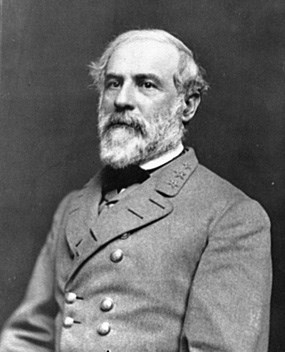
Robert Edward Lee was born on January 19, 1807, at "Stratford" in Westmoreland County, Virginia. He was the fifth child born to Henry "Light-Horse Harry" Lee and his second wife, Ann Hill (Carter) Lee. He grew up in an area where George Washington was still a living memory. Educated in the Alexandria, Virginia, schools, he obtained appointment to West Point in 1825. In 1829, Robert E. Lee graduated second in the class without a single demerit against his name. He was commissioned a brevet 2nd Lieutenant of Engineers. On June 30, 1831, he married Mary Ann Randolph Custis. They had seven children. All three of their sons served in the Confederate army. George Washington Custis and William Henry Fitzhugh ("Rooney") attained the rank of Major General and Robert E. Lee, Jr., that of Captain. The latter served as a private in the Rockbridge Artillery at the Battle of Antietam. During the Mexican War, Robert E. Lee was promoted to Colonel due to his gallantry and distinguished conduct in performing vital scouting missions. In 1852, he became Superintendent of the Military Academy. In 1855, Secretary of War Jefferson Davis transferred Lee from staff to line and was commissioned Lieutenant Colonel 2nd Cavalry. He was then sent to West Texas, where he served from 1857-1861. In February of 1861, General Winfield Scott recalled Lee from Texas when the lower South seceded from the Union. Politically, Robert E. Lee was a Whig. Ironically, he was attached strongly to the Union and to the Constitution. He entertained no special sympathy for slavery. When Virginia withdrew from the Union, Lee resigned his commission rather than assist in suppressing the insurrection. His resignation was two days following the offer of Chief of Command of U.S. forces under Scott. He then proceeded to Richmond to become Commander-in-Chief of the military and naval forces of Virginia. When these forces joined Confederate services, he was appointed Brig. Gen. in the Regular Confederate States. Lee returned to Richmond in March of 1862 to become military advisor to President Davis. Whenever he had a plan, General Lee took the initiative and acted at once. Cutting off supplies and reinforcements executed by Jackson at Seven Pines was a successful Confederate venture. He also stopped McClellan's threat to Richmond during the Seven Days Battle (June 26-July 2, 1862). At the Battle of Second Manassas, Lee defeated Pope. At the Battle of Antietam, his Northern thrust was checked by McClellan; however, he repulsed Burnside at Fredericksburg in December of 1862. In May of 1863, Gen. Lee defeated Gen. Hooker at Chancellorsville, but was forced onto the strategic defensive after Gettysburg in July. On April 9, 1865, Lee surrendered to Ulysses S. Grant at the village of Appomattox Court House. After the surrender, Lee returned to Richmond. He assumed the presidency of Washington College (now Washington and Lee University). His example of conduct for thousands of ex-Confederates made him a legend even before his death on October 12, 1870. General Robert E. Lee is buried at Lexington, Virginia. |
Last updated: April 10, 2015
